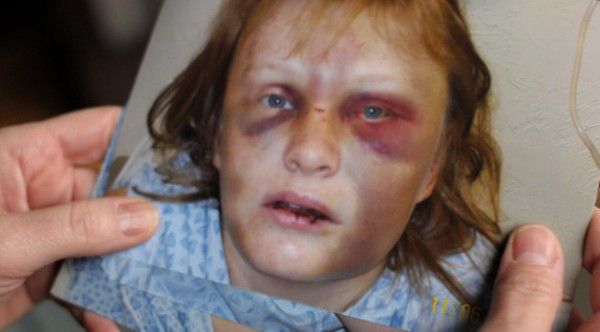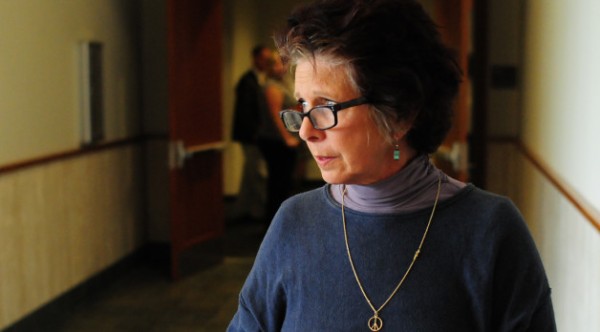PRIVATE VIOLENCE (Cynthia Hill, 2014)
Film Society of Lincoln Center, Walter Reade Theater
165 West 65th St. at Amsterdam Ave.
Friday, June 13, 7:00
Festival runs June 12-22
212-875-5601
www.privateviolence.com
www.ff.hrw.org
 More than thirty years after Faith McNulty’s book The Burning Bed, which was adapted into a powerful and influential 1984 film starring Farrah Fawcett, Private Violence shows that there is still a long way to go in dealing with the very real issue of battered women. In the moving, emotional documentary, director-producer Cynthia Hill tells the story of Deanna Walters, an abused North Carolina housewife working with advocates Kit Gruelle and Stacy Cox to try to put Deanna’s dangerous and abusive husband behind bars so she can have a life with her young daughter. It’s horrifying to see photos of Deanna’s severely beaten face and body, then hear that law enforcement agencies and the legal system still often regard such cases as minor domestic disputes that do not require arrests and imprisonment. At the center of the controversy is the prevailing attitude that it is somehow the woman’s fault for not simply leaving her abusive partner, instead returning again and again for more physical and psychological torture, a premise that is proved wrong in many ways. Hill (The Guest Worker, Tobacco Money Feeds My Family) concentrates on the main narrative, not talking heads and statistics, following the developments procedurally, while more is revealed about Kit as well, who suffered her own torment at the hands of an abusive husband.
More than thirty years after Faith McNulty’s book The Burning Bed, which was adapted into a powerful and influential 1984 film starring Farrah Fawcett, Private Violence shows that there is still a long way to go in dealing with the very real issue of battered women. In the moving, emotional documentary, director-producer Cynthia Hill tells the story of Deanna Walters, an abused North Carolina housewife working with advocates Kit Gruelle and Stacy Cox to try to put Deanna’s dangerous and abusive husband behind bars so she can have a life with her young daughter. It’s horrifying to see photos of Deanna’s severely beaten face and body, then hear that law enforcement agencies and the legal system still often regard such cases as minor domestic disputes that do not require arrests and imprisonment. At the center of the controversy is the prevailing attitude that it is somehow the woman’s fault for not simply leaving her abusive partner, instead returning again and again for more physical and psychological torture, a premise that is proved wrong in many ways. Hill (The Guest Worker, Tobacco Money Feeds My Family) concentrates on the main narrative, not talking heads and statistics, following the developments procedurally, while more is revealed about Kit as well, who suffered her own torment at the hands of an abusive husband.
Sharply shot by photojournalist and cinematographer Rex Miller (Behind These Walls, Hill’s PBS food series A Chef’s Life), the award-winning film opens with a gripping six-minute scene that brings viewers right into the middle of a harrowing situation. “I sometimes refer to restraining orders as a last will and testament because battered women are the experts in what’s happening in their relationship, and we need — society — we need to treat them like the experts that they are,” Kit says shortly thereafter in a radio interview. “When she says, ‘He is going to kill me,’ or ‘He’s going to kill my family,’ or ‘He’s going to kill my cousin if he can’t get to me,’ we have got to step on the brakes and slow down and take that whole thing seriously.” A presentation of HBO Documentary Films, Private Violence is having its New York premiere June 13 at the Walter Reade Theater in the “Women’s Rights and Children’s Rights” section of the 2014 Human Rights Watch Film Festival and will be followed by a panel discussion with Hill, Gruelle, Walters, and executive producer Gloria Steinem, moderated by Liesl Gerntholtz. The twenty-second HRWFF runs June 12-22 at Lincoln Center, the IFC Center, and the Times Center and comprises twenty-two films that explore such other themes as “LGBT Rights,” “Human Rights Defenders, Icons, and Villains,” “Armed Conflict and the Arab Spring,” and “Migrants’ Rights” through such works as Khalo Matabane’s Nelson Mandela: The Myth and Me, Jennifer Kroot’s To Be Takei, Sara Ishaq’s The Mulberry House, and Mano Khalil’s The Beekeeper.

